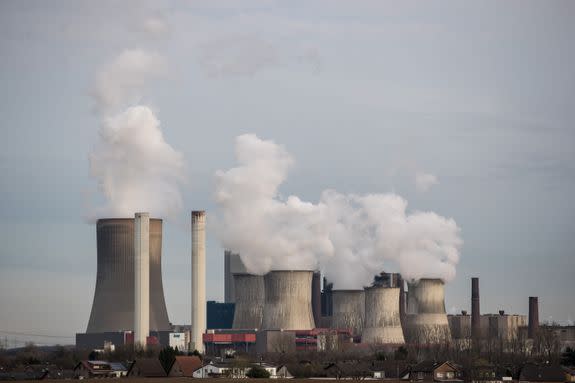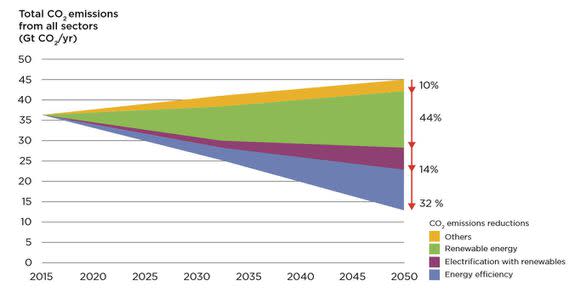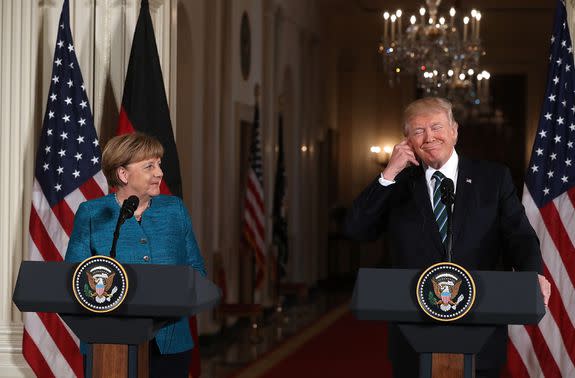This treaty has a massive, $19 trillion upside, but Trump may walk away anyway

The United States could soon walk away from a trillion-dollar opportunity if some influential players in the Trump administration have their way.
The Paris Climate Agreement may global boost the economy by $19 trillion over the next three decades as countries invest in renewable energy, energy efficiency and zero-emissions transportation, according to a report by two global energy agencies.
SEE ALSO: Earth just had its second-warmest February on record
Such investments are essential for meeting the targets of the Paris treaty — a landmark deal that aims to limit global warming in order to avoid dangerous impacts including sea level rise and extreme weather events.
Trump is considering pulling the U.S. out of the global agreement. If he does so, the U.S. could miss out on many of the economic benefits identified in the report, which was commissioned by the German government.
Beyond protecting the planet, all the world's clean-energy spending will grow the global economy by around 0.8 percent by 2050, the International Renewable Energy Agency (IRENA) said Monday in a new study, which it produced with the International Energy Agency (IEA).
In addition, renewable energy investments could yield an additional 6 million jobs through the same period, the report found.
"Critically, the economic case for the energy transition has never been stronger," Adnan Amin, director-general of IRENA, an intergovernmental organization, said Monday in a statement.
A key point in the report, though, is that delaying the transition to a cleaner energy system would be more costly.
"We are in a good position to transform the global energy system, but success will depend on urgent action, as delays will raise the costs of decarbonization," Amin added.

Image: maja hitji/Getty Images
Still, that transformation won't come without major investments. Revamping the global energy system could require $145 trillion in investment in low-carbon technologies by mid-century, IRENA said.
By leaving the Paris agreement, the U.S. would cede its leadership on clean energy to China and other big economies. It would also undermine the world's chances of meeting the Paris goals.
Under the treaty, which officially entered into force last November, nations agreed to keep global warming to well below 2 degrees Celsius, or 3.6 degrees Fahrenheit, above preindustrial levels through 2100. The deal also contains a more aggressive aspirational goal of limiting warming to 1.5 degrees Celsius, or 2.6 degrees Fahrenheit.

Image: IRENA
To achieve the 2-degree target, the world would have to dramatically slash its energy-related carbon dioxide emissions by replacing oil, coal and natural gas with wind, solar and other renewable sources.
Energy-related CO2 emissions must shrink to 9.5 gigatons by 2050, down from 32 gigatons in 2015, the energy agencies said in their report. That means renewables should account for at least 65 percent of global power generation by the middle of the century — up from 24 percent today.
Meanwhile, total fossil fuel use would shrink to a third of today's level.
"The clear conclusion is that governments must act now to begin a managed decline of the fossil fuel industry, a process that is both achievable and affordable with clean energy," Greg Muttitt, senior advisor at Oil Change International, a climate advocacy organization, said in response to the report.

Image: justin sullivan/Getty Images
German Chancellor Angela Merkel commissioned the IRENA study to guide upcoming climate and energy discussions for the Group of 20 economies, which began this week in Germany.
But in a big blow to pro-climate leaders, G-20 finance ministers and bankers on Saturday dropped their pledge to finance the fight against climate change — a move seen as acquiescing to the Trump administration's demands, Reuters reported.
